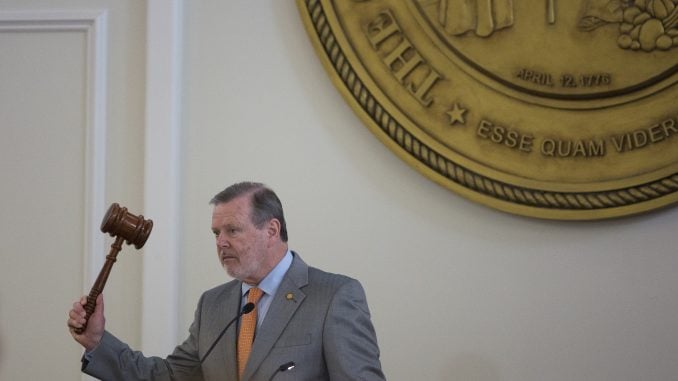
RALEIGH Bickering between the branches of state government over budget numbers began this week as the N.C. Senate released, and subsequently passed, its plan. The proposal includes an increase of the standard tax deduction to $20,000, a $1 billion tax cut, teacher salary raises, and disaster relief and recovery funds among other appropriations. Wednesday, at an annual meeting of county commissioners, Gov. Roy Cooper encouraged them to look past partisan politics and focus on finding common ground.”It’s important for Republican and Democratic county commissioners, as well as a Democratic governor with a Republican legislature, for the first question to be, ‘Where do we agree?’,” said Cooper addressing the local politicians. “Where can we find consensus to go forward? That’s what we all should be asking, because we’ve never been as polarized politically as a State and as a country as we are right now.”However, as the N.C. Senate was passing its budget Thursday, the Cooper administration eschewed the search for common ground and instead attacked Senate Republicans saying their plan favored the rich over the poor, tapping in to a class warfare theme utilized during his campaign.”Gov. Cooper’s budget offered a blueprint to invest in middle class families, expanding opportunity and building an economy that works for everyone,” said Cooper spokesman Ford Porter in a press release. “The Senate budget simply keeps prioritizing the wealthy over the middle class and falls short.”That theme was evident during floor debate of the budget, with Senate Democrats consistently comparing the senate proposal to that of Cooper’s, eliciting an official response from the office of Senate Leader Phil Berger (R-Rockingham).”We understand the governor’s communications office is sending charts, and Senate Democrats spent most of today’s floor debate, comparing the governor’s budget to the Senate’s budget,” wrote Berger’s Deputy Communications Director Shelly Carver in a written statement. “We don’t think this comparison is terribly insightful, since as Sen. Berger said Tuesday both budgets contain many of the same funding priorities, but the difference is in funding levels. We are certain we could also come up with a few dozen Senate priorities that the governor’s proposal failed to address.”As Democrats pressed on with their critique of tax cut provisions, including lowering personal and corporate income tax rates and increasing the standard deduction, Sen. Bill Rabon (R-Brunswick) offered a tongue-in-cheek amendment to the budget bill that would have reverted tax rates to where they were in 2009 before Republicans gained a majority, a substantial increase from current rates.Only five Democrats voted in favor of the amendment – Sens. Blue (Wake), Foushee (Orange), Lowe (Forsyth), Robinson (Guilford), and Waddell (Mecklneburg) – while the rest resisted following through on their rhetoric.As the House proposed budget comes together over the course of the next week it is likely to close the gap, to a certain degree, with the governor’s recommended spending numbers if past House budget plans are any indication.Still, Berger offered explanation for why their budget does not match the governor’s proposals like a puzzle piece.”While the governor’s proposal obviously spends more exorbitantly, we remember the consequences we faced in 2011 (including a $2.5 billion budget deficit) after previous state leaders undertook years of spending at unsustainable levels,” stated Berger in a release. “Our philosophy has always been to spend prudently on priorities, save carefully to protect against the next recession and return a portion of any over-collection of taxes back to the people who paid them.”While there is an abundance of common ground between the divided branches of government on spending concerns, the squabble is likely to continue until the final plan passes the General Assembly and heads to the governor’s desk for signature. Cooper may then find sufficient “consensus to go forward.”



